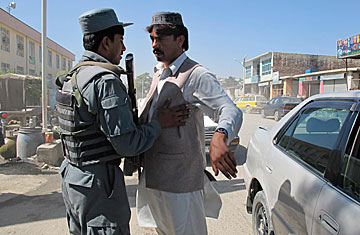
An Afghan policeman bodychecks a man in Khost, Afghanistan, on Oct. 2, 2011. Security measures are tight in the country after the Afghan and coalition forces captured Haji Mali Khan, a senior Haqqani leader
(2 of 2)
General Orya Khail, a corps commander in Khost province, says the number of Haqqani fighters on the border is "increasing day by day." Asked if Afghan security forces should go into Pakistan to root out the Taliban in their bases, he tells TIME, "We can't even ensure security in our own country, how we can go into Pakistan to clear the area? Look at our provinces: in Logar we can't go to the villages although Logar is the closest province to Kabul. Now it's not advantageous for Afghanistan to fight on the border. We should take care of our local problems first. The main challenges are corruption and strengthening the army and other security forces."
On the political side, the situation is no easier. Repeated allegations by the Afghan and U.S. governments that the Haqqani network is supported by Pakistan's ISI were somewhat corroborated last week, when Lutfullah Mashal, the spokesman for the National Directorate of Security (NDS), Afghanistan's version of the FBI, announced that evidence gleaned from the capture of an insurgent shows that the plans to assassinate Rabbani were drawn in Quetta, Pakistan. "Photos, maps and videos showed that it was planned in Quetta," Mashal tells TIME. As a result, Karzai pulled out of tripartite talks between Afghanistan, Pakistan and the U.S. scheduled for this week.
But Ruttig, of the AAN, says, "It is difficult to prove that the ISI is behind, or advises in, particular operations of the Haqqani network, or, for that matter, other Taliban subgroups or other terrorist organizations. Often, reports about the Haqqani network or other organizations' involvement in certain attacks remain unclear. This is still the case in the latest attacks." For what it's worth, both the Pakistani and Taliban spokesmen have denied that links exist between the ISI and the Haqqani network. At the same time, Zabiullah Mujahid, a well-known Taliban spokesman, tells TIME, "Siraj Haqqani is one of the best commanders and mujahid of the Afghan people, and he is with us." Though relations between the Taliban and the Haqqani network have never been completely clear, Mujahid says recent overtures made by the Karzai government to bring Siraj Haqqani into the government have failed: "Yes, a few days ago as always, the government told Siraj Haqqani to come to the government and he would be given a high ranking position, but they got a negative answer back."
Now, ever fragile relations between the current government in Kabul and the Pakistanis are at a low ebb. Deputy National Security Adviser Shaida Mohammad Abdali told the Wall Street Journal: "From now on Afghanistan will follow the 'trust but verify' approach toward Pakistan, in particular with regard to our peace effort." Karzai himself said that Kabul could no longer negotiate with the Taliban, and the only viable negotiating partner is Pakistan, a provocative declaration dismissed by Islamabad, which would not have been pleased by Karzai's visit last week to India (an archenemy in the minds of many Pakistani strategists), during which he signed a strategic cooperation deal with New Delhi.
Despite the ramped-up military pressure on the Haqqani network and diplomatic pressure on Pakistan, Mashal of the the NDS believes Kabul will see more spectacular attacks like those the group has been accused recently of carrying out. "We do predict more terrorist attacks, but they won't be successful. We are capable of stopping them, God willing." But they have not been in the past.
— With additional reporting by Walid Fazly
